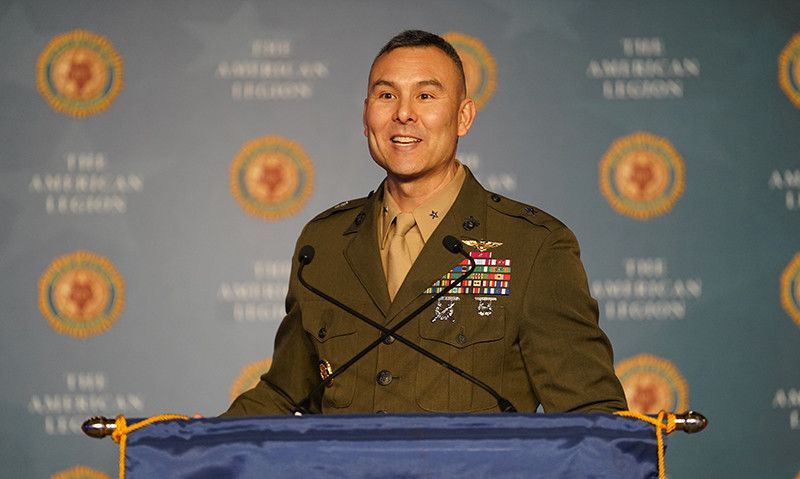
Brigadier General to Legion: ‘provide a spark’
U.S. Marine Corps Brig. Gen. Stephen Lightfoot’s primary challenge is to foresee future military conflicts and make sure America has the weapons, equipment, technology, relationships and training necessary for success.
All that, he told attendees of The American Legion’s Washington Conference Tuesday, is not enough. “We can get everything else right, but it won’t work if we can’t recruit the best and retain the right young men and women. The primary ingredient for our success remains the individual Marine. Our young Marines remain our asymmetric advantage against any adversary.”
As director of the Capabilities Development Directorate for the U.S. Marine Corps – a three-tour combat aviator and former Marine 1 pilot – Brig. Gen. Lightfoot gave Legionnaires glimpses into a changing force structure, a redesign that emphasizes joint operations (in his case, emphatically between the U.S. Navy and the Marine Corps), agility, relationships with allies and communications. To meet the needs of a changing geopolitical landscape, recruitment, talent management, training and education of personnel are high priorities in today’s Marine Corps.
“One thing remains constant: the quality of your Marines. We continue to produce tough, resilient and lethal Marines. As director for capabilities and requirements, my focus is to ensure we provide your Marines with what they need to fight and win at any time and place, for any mission.”
One issue the Marines – and all branches – are facing is attracting top young people to serve. That, he said, is where The American Legion can help. “We need you to engage with our nation’s youth. We need you to talk about your experience. Talk about the value, the purpose, the camaraderie and the adventure of serving your country.”
He noted that less than a quarter of those wanting to enlist actually qualify, and that narrows the pool to a small percentage of the U.S. population. To attract more talent to the Marine Corps, he asked Legionnaires to tell young people about the benefits of service.
“Please provide that spark. That motivation … you can change an individual’s life. Once we welcome recruits into our ranks, it will be our job to ensure we train and retain the absolute best. The operating concepts we will employ require our junior enlisted to be more highly trained than ever before. They will be more lethal, experienced and versatile in tomorrow’s operating environment.”
Brig. Gen. Lightfoot said he is “consistently impressed” with the intelligence and willingness of young Marines to “lean forward in a dynamically changing world. They are thinking and problem-solving way ahead of when I was in their boots.”
He listed the “unique recruiting environment” among three pressing needs the Marines are trying to address, the other two being the urgency of modernization to keep pace with adversaries who are not constrained by continuing budget resolutions and the need to strengthen the nation’s amphibious capabilities, especially with China standing as the foremost national security threat.
The arc of integrated military operations across the branches is expected to accelerate in the months and years ahead, he added. “The next major conflict will not be the USMC vs. China. It will 100% be a joint and partnered force bringing the hammer down on those that seek to do us and our allies harm.”
Among many relationships – allied nations, other branches of service, etc. – The American Legion plays an important role, he said. “For the next generation to succeed, it will require those serving now to join veterans groups like The American Legion to ensure servicemembers’ best interests are being fought for at all levels of government. The American Legion has been there for us and will continue to be there for us.”
He explained that The American Legion’s contributions to the military community over the decades is not lost on today’s generation.
“When VA health care was lacking, untimely and confusing, The American Legion was there. When our female veterans lacked access to imaging services and modern technology, The American Legion was there. When members of the greatest generation needed medical services and nursing home care, The American Legion was there. As our veterans from Operation Iraqi Freedom and Operation Enduring Freedom struggle to transition back from combat – struggle with mental health, struggle with rejoining the civilian workforce and struggle with exposure concerns and benefits – The American Legion was there … your service has not stopped. Your service to this country has never waned, and your dedication to supporting our nation’s warfighters remains resolute.”
And, he said, new generations will continue to build on that legacy. “Our future remains bright because our people remain our strength … I trust that the next generation will add sturdy walls and a roof to the structure of freedom that made our country the greatest in the world.”
